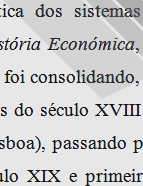

................................
Several factors may have contributed to his undertaking this enormous task (spanning around three decades): a) the scarcity of "subsidies for the study of economic history, especially in ancient times and the middle ages" (Adriano Antero, História Económica, vol. I, 1905, pp. XV-XVI); b) pedagogical motivations, as a professor of the subject at the Industrial and Commercial Institute of Porto, which also likely led to the adoption of the work's title, as the author himself clarifies: "The title of História Económica is the official title by which, according to the reform of the Commercial and Industrial Institutes by Emygdio Navarro, under whose reform this work began to be written, the discipline that addressed the history of commerce and industry was known" (Id., Idem, vol. V, 1921, initial p.). From the overall plan of the work, its didactic nature, universal rather than national in scope, emphasis on commerce and industry, and lesser attention to transport and communications can be deduced. The author attributes significant importance to geography—in line with one of the trends of the time, evident, for example, in the work of Lucien Febvre—by identifying economic factors that influence society: "location, surface, aspect, climate, population, industries, and communications" (Id., Idem, vol. I, 1905, p. V). Another author who was devoted to economic history—in this case, that of Portugal—was Francisco António Correia (1877-1938). Unlike most of the previously mentioned historians, who acquired their education at the Faculty of Law of the University of Coimbra, Francisco António Correia completed with distinction the higher commerce course at the former Industrial Institute of Lisbon (later the Higher Institute of Economic and Financial Sciences), where he went on to become a full professor (1917) and director (1917-28). He also held various other positions. He published Política Económica Internacional [International Political Economy] (1922), Estudos de Política Económica e Internacional [Political and International Economy Studies](1935), and História Económica de Portugal [Economic History of Portugal] (vols. I and II, 1929-1931). This was the first published economic history of Portugal, as the afore- mentioned work of Adriano Antero was universal in scope, as has been seen. In the preface to the first volume, the author clarifies the following: "In preparing the 'História Económica de Portugal,' the aim was primarily to concretize and highlight the various phases of the evolution of the national economy, with the characteristics that give it its own individuality [...] A synthetic study was sought, without delving into the domains of our political history, except when knowledge thereof is necessary for understanding the national economy" (Francisco António Correia, História Económica de Portugal, vol. I, 1929, pp. VI-VII).
